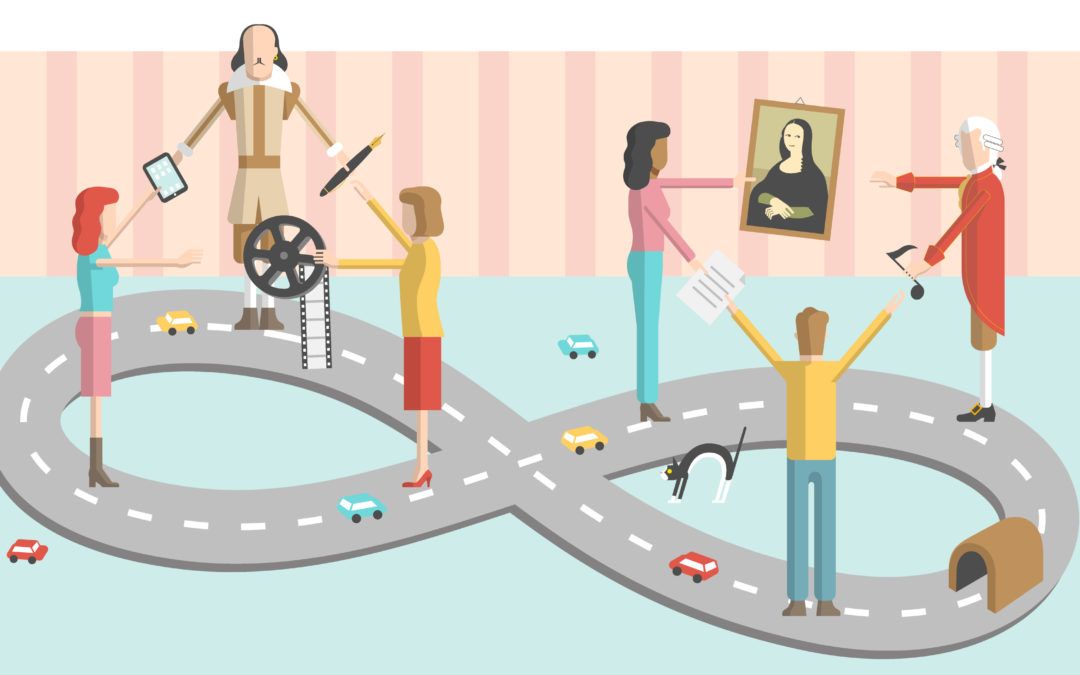The COVID-19 pandemic has changed our way of living and working. We want to remind everyone who is adapting to online working – including teachers and students, creators, cultural heritage practitioners, and other ‘copyright users’ – that all the resources available on CopyrightUser.org are distributed under a Creative Commons-Attribution licence. This means that you are free to use all the original materials you find on the website, such as texts, videos, animations and illustrations, for any purpose, under the only condition of crediting the author of the work.
The following resources might be particularly useful for anyone interested in better understanding how they can reuse existing materials in online teaching or other contexts:
The Game is On! – a series of short animated films accompanied by 33 Case Files (explanatory texts suggesting points of discussion on specific copyright topics) that provide a springboard for exploring copyright, creativity and the lawful reuse of existing materials. The series itself is an example of how you can lawfully reuse materials in the creation of new work: below each film you can find annotated scripts which list the many works that have been reused to create the series: https://www.copyrightuser.org/educate/the-game-is-on/
Copyright Exceptions – specific circumstances in which protected work can be used without the need to seek or obtain permission from the copyright owner. There are a number of copyright exceptions set out in the UK Copyright, Designs and Patents Act 1988, concerning non-commercial research and private study, quotation, uses by people with disabilities, news reporting, education, and other uses. At the following link you can find specific guidance on each of these copyright exceptions: https://www.copyrightuser.org/understand/exceptions/
A lesser known, albeit relevant, UK copyright provision that the Copyright User website has not addressed yet is s.171(3), which provides the so-called ‘public interest defence’. Under this provision, courts may prevent or otherwise limit ‘the enforcement of copyright, on grounds of public interest or otherwise’ – for example, in conflicts between the right of freedom of expression and the rights provided by the UK Copyright Act. Recently, several UK associations have defended that public libraries, research organisations and educational establishments should be able to use the public interest defence – for the duration of the COVID-19 crisis – to reduce the risk of facing claims of copyright infringement when shifting to online teaching, learning and research activities.
Copyright Bites – a series of short animated videos accompanied by explanatory texts that explore the relationship between copyright and the public domain (the pool of materials that are out of copyright and permitted uses of protected works): https://www.copyrightuser.org/create/public-domain/copyright-bites/
Copyright Duration – commentary explaining how long copyright lasts and what you should consider when calculating the copyright term of different types of works: https://www.copyrightuser.org/create/public-domain/duration/
We also offer sector-specific guidance for cultural heritage practitioners and for music writers and composers:
Copyright for Museums and Galleries: https://www.copyrightuser.org/educate/intermediaries/museums-and-galleries/
Exceptions for Libraries: https://www.copyrightuser.org/educate/intermediaries/libraries/
Going for a Song: https://www.copyrightuser.org/create/creative-process/going-for-a-song/
All the materials above are distributed under a Creative Commons-Attribution licence, meaning that you are free to copy and redistribute the material in any medium or format, and to remix, transform, and build upon the material for any purpose, even commercially. The only condition is to give appropriate credit to the author of the material.
Sources of free-to-use materials
The following websites provide content that can be freely edited and included in your own work:
- Wikimedia Commons – Images, sound and video.
- Incompetech – Music
- Flickr – Images
- Unsplash – Images
- Wikisource – Books
Works created by the United States federal
government are in the public domain (Section 105 US Copyright Act). Useful
sources of public domain content created by the US federal government include:
Most material available at the links above is in the public domain and free for everyone to reuse. However, it is advisable to double-check the usage conditions of each item you would like to reuse.
How you can help

Various cultural heritage organisations, publishers and other repositories of knowledge and information are taking steps to unlock their collections and share their data to inform the public health response to the COVID-19 outbreak.
At the following link you can find the Wellcome statement on ‘Sharing research data and findings relevant to the novel coronavirus (COVID-19) outbreak’: https://wellcome.ac.uk/press-release/sharing-research-data-and-findings-relevant-novel-coronavirus-covid-19-outbreak
A group of scientists, legal scholars, practitioners, entrepreneurs and individuals are working to promote the removal of potential obstacles involving intellectual property in the fight against COVID-19. You can find more information about the Open COVID Pledge here: https://opencovidpledge.org/
The Creative Industries Federation is in ongoing conversation with the UK government to ensure that their support better fits the needs of the creative industries. They have curated a list of support measures announced by the government that may be beneficial to freelancers and self-employed working in the creative industries: https://www.creativeindustriesfederation.com/news/covid-19-support-government
More than 140 education and research organisations as well as individuals have written to Director General Francis Gurry to ‘encourage WIPO to take a clear stand on how important intellectual property limitations and exceptions can be’ in response to the Coronavirus (COVID-19) pandemic. You can find the letter here: https://docs.google.com/document/d/1ExyphyMfvUTlPj7vZ3wvbIIEqv4nhBpyLcV0_n1H5e8/edit
We encourage all organisations and individuals to consider whether and how they can share data, knowledge and resources that might assist the public health response to the outbreak, or otherwise help others adapt to this unsettling situation.

